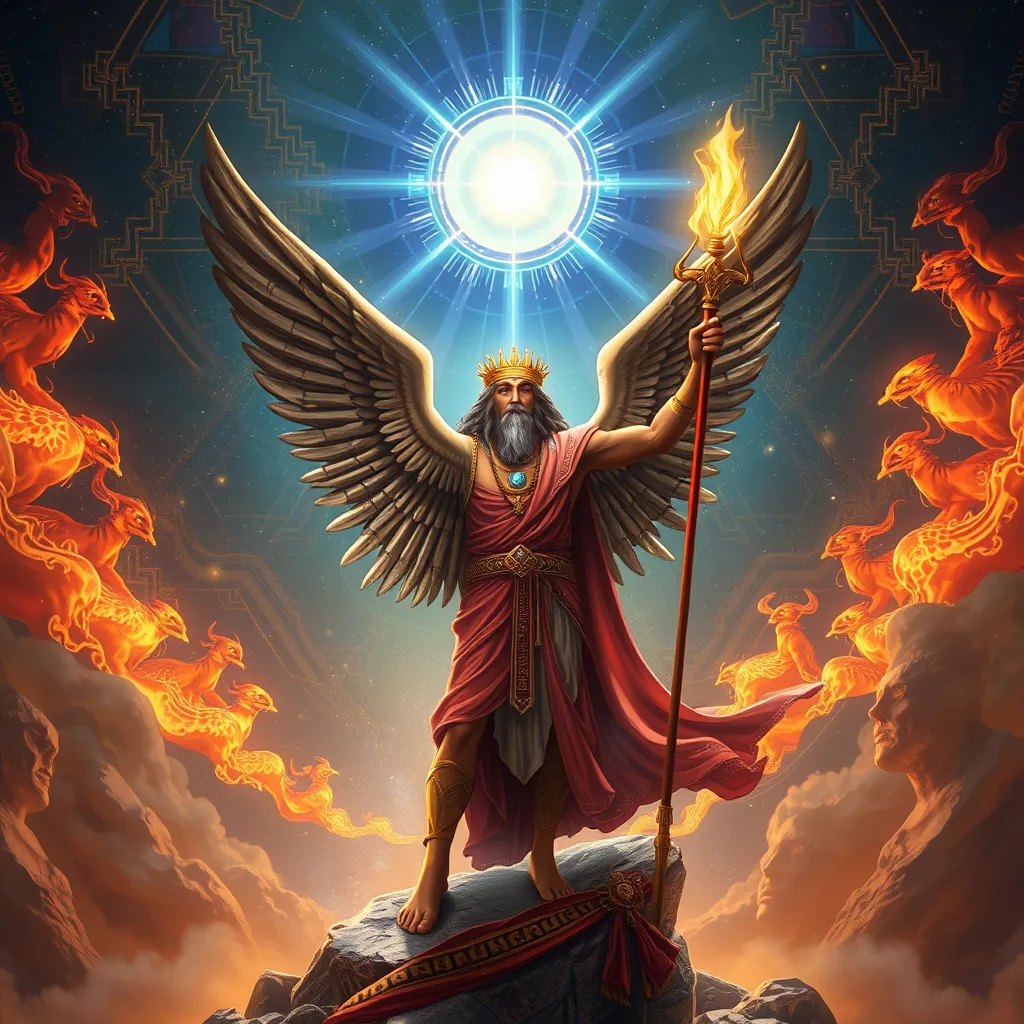The Divine Messenger: The Myths of Hermes Trismegistus
I. Introduction to Hermes Trismegistus
Hermes Trismegistus is a figure that straddles the realms of history and mythology, embodying the synthesis of Greek and Egyptian traditions. Recognized as a divine messenger, he is credited with profound wisdom and knowledge, often associated with the secrets of the cosmos. The name Trismegistus, meaning thrice-great, signifies his exalted status, suggesting mastery in three areas: philosophy, astrology, and alchemy.
In ancient mythology and religious traditions, Hermes serves as a bridge between the mortal and divine, facilitating communication and understanding. His legacy is woven into the fabric of various belief systems, where he is revered as a source of enlightenment and guidance.
II. The Origins of Hermes Trismegistus
The origins of Hermes Trismegistus can be traced back to the fusion of the Greek god Hermes and the Egyptian god Thoth. Both deities were associated with writing, knowledge, and communication. Hermes, known for his cunning and role as a messenger, complemented Thoth’s wisdom and association with the moon.
During the Hellenistic period, the cultural exchange between Greece and Egypt gave rise to Hermeticism, a spiritual and philosophical system that blends elements of both traditions. This synthesis laid the groundwork for the myths surrounding Hermes Trismegistus, establishing him as a pivotal figure in esoteric thought.
III. The Hermetic Texts: Sources of Wisdom and Knowledge
The Hermetic tradition is rich with texts attributed to Hermes Trismegistus, with the most notable being the Corpus Hermeticum. This collection of writings encompasses a wide array of topics, including philosophy, theology, and the nature of the cosmos.
- Key Themes:
- The unity of the divine and the material world
- The importance of self-knowledge and inner transformation
- The pursuit of spiritual enlightenment through gnosis
Hermetic literature has significantly influenced various fields, including philosophy, science, and spirituality. The ideas espoused in these texts have resonated through the ages, shaping the thoughts of prominent figures such as Plato, Newton, and even modern spiritual seekers.
IV. Hermes as a Divine Messenger
In his role as a divine messenger, Hermes serves as a mediator between gods and humans. He is often depicted as guiding souls to the afterlife, symbolizing his capacity to traverse different realms. This duality reflects the belief in the interconnectedness of the divine and human experiences.
The symbolism of Hermes extends to communication and transcendence, representing the flow of knowledge and wisdom between the earthly and spiritual planes. His messages, laden with profound insights, hold significant importance within the context of ancient beliefs, providing direction and understanding to those who seek it.
V. The Concept of Alchemy and Hermes Trismegistus
Hermes Trismegistus is inextricably linked to the practice of alchemy, often regarded as the father of this mystical art. Alchemy, traditionally viewed as a quest for transforming base metals into gold, symbolizes a deeper spiritual transformation.
- Key Symbols of Alchemy:
- The philosopher’s stone: representing ultimate knowledge and enlightenment
- The magnum opus: the journey of self-realization and mastery
This transformative process reflects the broader Hermetic worldview, which emphasizes the pursuit of inner truth and the realization of one’s potential. Through alchemical practices, practitioners seek to align themselves with cosmic principles, leading to spiritual awakening and enlightenment.
VI. The Influence of Hermes Trismegistus in Later Traditions
During the Renaissance, there was a resurgence of interest in Hermes Trismegistus and Hermeticism. Scholars and practitioners sought to rediscover the wisdom of antiquity, leading to a revival of esoteric knowledge. This period saw the integration of Hermetic principles into various spiritual and philosophical movements.
Hermes Trismegistus also found connections with other mystical traditions, such as:
- Kabbalah
- Astrology
- Gnosticism
His enduring legacy continues to influence modern esoteric and occult practices, where his teachings are revered for their depth and insight.
VII. Critical Perspectives on the Myths of Hermes Trismegistus
Scholarly debates surrounding the historicity of Hermes Trismegistus reveal a complex interplay between myth and reality. While some scholars argue for the existence of a historical figure, others emphasize the mythological aspects of his identity.
This contrast between myth and historical reality raises important questions about the implications of these myths in understanding ancient cultures. The stories of Hermes Trismegistus serve not only as a reflection of the beliefs of the time but also as a lens through which we can explore the values and aspirations of ancient civilizations.
VIII. Conclusion: The Relevance of Hermes Trismegistus Today
The fascination with Hermes Trismegistus endures, as his teachings continue to resonate with contemporary seekers of knowledge and truth. Hermetic principles, emphasizing the interconnectedness of all things and the pursuit of self-knowledge, remain relevant in modern spirituality.
As we navigate the complexities of modern life, the legacy of the Divine Messenger invites us to explore our inner worlds and seek enlightenment. Hermes Trismegistus stands as a timeless symbol of wisdom, bridging the ancient and the contemporary, reminding us of the eternal quest for understanding and transcendence.




